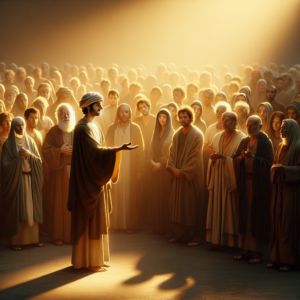Spiritual Devotional about Spirituality and Science
Title: Bridging the Divine and the Discoverable: Spirituality and Science
Hello Beloved,
Isn’t it awe-inspiring to consider how the wonders of science and the mysteries of spirituality often intertwine, bringing us closer to the Creator in ways we might never have imagined? In our journey of faith, we often come across the age-old question: Can spirituality and science coexist? The answer is a resounding "Yes!"
In fact, the Bible is filled with examples of God’s creation that inspire scientific discovery. Psalm 19:1 declares, "The heavens proclaim the glory of God; the skies display his craftsmanship." This verse sums it up beautifully—the more we understand the universe, the more we can appreciate the grandeur and genius of our Creator.
Let’s unpack this further:
1. The Harmony of Creation:
When we look at the intricacies of the natural world, from the microscopic beauty of a single cell to the vast expanse of the cosmos, we cannot help but marvel at the handiwork of a divine Creator. In Genesis 1:31, we read, "God saw all that he had made, and it was very good." Science gives us the tools to explore and appreciate that "very good" creation in greater detail.
Consider how Jesus spoke in parables, using elements of nature to teach profound spiritual lessons. Similarly, science uses observation and experimentation to unpack the mysteries of God’s world. This exploration can deepen our reverence for God’s genius.
2. Divine Laws and Natural Laws:
God established natural laws that govern our universe, and through science, we can uncover these laws and see how intricately and wisely the world is woven together. Proverbs 25:2 tells us, "It is the glory of God to conceal a matter; to search out a matter is the glory of kings." Each scientific discovery is like unwrapping another layer of God’s immense creativity and intelligence.
3. Faith and Reason:
Faith and reason are not adversaries; they are complementary forces. Hebrews 11:3 says, "By faith, we understand that the universe was formed at God’s command so that what is seen was not made out of what was visible." Faith offers us the lens to see purpose and meaning, while science provides the evidence-based framework to understand the mechanism.
Practical scientists, such as Isaac Newton, who was deeply religious, saw their work as a way to worship and understand God better. Isn’t it encouraging to know that our quest for knowledge doesn’t take us further from God but closer to His divine mind?
4. Miracles and Medical Science:
Miracles are those divine interventions where the natural order is superseded by God’s power. Yet, advancements in medical science are also a form of divine blessing. Every healing and every medical breakthrough is a testament to the Creator who endowed humans with the intellect and creativity to bring about restoration and relief. In John 9, Jesus heals a man born blind, displaying divine power. Today, through the intelligence God has given us, we see partial eyesight restoration through medical science—another form of God’s healing work.
5. Spiritual Fulfillment through Scientific Understanding:
God has instilled in us an insatiable curiosity to seek and discover. Ecclesiastes 1:13 says, "I applied my heart to seek and to search out by wisdom all that is done under heaven." As we delve into scientific truths, we can find spiritual fulfillment, knowing that each discovery is another piece of the puzzle of God’s grand design.
6. Unity in Diversity:
Science and spirituality can uplift us, showing the unity in diversity—the interconnectedness of all things. Ephesians 4:4-6 reads, "There is one body and one Spirit… one God and Father of all, who is over all and through all and in all." Whether we look through a microscope or telescope, we see the divine thread that connects everything.
Dear Friends, let’s celebrate the harmony between spirituality and science. Each complements the other, providing a fuller, richer understanding of the world and our place in it. As we continue our spiritual journey, let us do so with open hearts and curious minds, rejoicing in every discovery as a revelation of God’s infinite love and wisdom.
May you be inspired to explore both the divine and the discoverable with a heart full of faith and a mind eager for understanding.
Blessings and peace,
[Your Name]
Explore and dig up answers yourself with our BGodInspired Bible Tools! Be careful – each interaction is like a new treasure hunt… you can get lost for hours 🙂
Q&A about Spirituality and Science
Certainly! Here’s a Q&A that explores the intersection between spirituality and science:
Q&A: Spirituality and Science
Q1: What is the primary focus of spirituality, and how does it differ from the focus of science?
A1:
Spirituality primarily focuses on the exploration of the inner self, emotional well-being, and the search for meaning and purpose in life. It often involves practices and beliefs related to the connection with a higher power or the universe. Science, on the other hand, is concerned with understanding the natural world through empirical evidence, observation, experimentation, and reason. The methodologies and aims of science are geared towards generating objective knowledge, while spirituality deals with subjective experiences and individual beliefs.
Q2: Can spirituality and science coexist, or are they fundamentally opposed?
A2:
Spirituality and science can indeed coexist, though they operate in different domains. They are not fundamentally opposed but rather complementary in certain aspects. Many individuals find that scientific understanding enhances their spiritual experiences by providing a deeper appreciation of the complexity and beauty of the universe. Conversely, some scientific pursuits have been inspired by questions rooted in spiritual inquiry. The key is to respect the different methodologies and purposes of each.
Q3: How have scientific studies explored the effects of spiritual practices like meditation and prayer?
A3:
Scientific studies have extensively investigated the effects of spiritual practices such as meditation and prayer on physical and mental health. Research suggests that these practices can lead to improvements in stress reduction, emotional regulation, concentration, and overall well-being. For instance, mindfulness meditation has been shown to decrease symptoms of anxiety and depression. Neuroimaging studies have indicated that regular meditation can alter brain structure and function, potentially enhancing areas related to attention, emotional processing, and self-control.
Q4: What is the "God gene" hypothesis, and what does it suggest about spirituality and genetics?
A4:
The "God gene" hypothesis, proposed by geneticist Dean Hamer, suggests that certain genes may predispose individuals to spiritual experiences. According to this hypothesis, a specific gene named VMAT2 could influence a person’s propensity for mystical experiences, spirituality, and religiousness. While the idea is intriguing, it remains controversial and has not been definitively proven. Critics argue that spirituality is a complex and multifaceted aspect of human life that cannot be reduced to a single gene.
Q5: How do quantum physics and spirituality intersect in modern discussions?
A5:
Quantum physics often enters discussions about spirituality due to its counterintuitive and mysterious nature, which challenges classical notions of reality. Concepts like wave-particle duality, entanglement, and the observer effect have been interpreted by some as having spiritual implications, suggesting interconnectedness and the influence of consciousness on the physical world. While these interpretations can be inspiring, it’s essential to approach them with caution; the scientific community generally maintains a clear distinction between empirical findings and speculative spiritual interpretations.
Q6: Are there any notable scientists who have bridged the gap between spirituality and science?
A6:
Several notable scientists have sought to bridge the gap between spirituality and science. Albert Einstein is often cited for his sense of wonder about the universe, which he expressed in spiritual terms despite not adhering to traditional religious beliefs. Carl Sagan emphasized the awe and reverence inspired by the cosmos. More contemporary figures, such as the Dalai Lama, have engaged in dialogue with scientists to explore the convergence of Buddhist philosophy and the cognitive sciences. These individuals exemplify how one can appreciate and find inspiration in both spirituality and science.
Feel free to ask more questions or request further elaboration on specific points!


